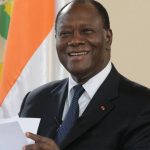Politics
Côte d'Ivoire Politics
This page explores Côte d’Ivoire‘s political structure incorporating real-time RSS feed news and videos. By harnessing the power of RSS feeds, visitors can stay informed about the latest developments in Côte d’Ivoire‘s politics as they happen. The dynamic nature of these feeds ensures that users receive up-to-the-minute updates on political events, policy changes, and significant milestones, enabling them to stay abreast of the ever-evolving political scene.

Alassane Ouattara
5th President of the Ivory Coast (Côte d’Ivoire)
Incumbent Assumed office 12/4/10
Image credit
Côte d’Ivoire, also known as Ivory Coast, operates under a presidential republic political structure. The country is a republic, where the President of Côte d’Ivoire serves as both the head of state and the head of government. The President is elected by popular vote for a five-year term and can be re-elected for a maximum of two terms. The President holds significant executive powers and is responsible for leading the government, implementing policies, and representing Côte d’Ivoire domestically and internationally.
The parliament of Côte d’Ivoire is a bicameral legislature known as the Parliament of Côte d’Ivoire. It consists of two chambers: the National Assembly and the Senate. Members of the National Assembly are elected through a direct vote, while Senators are elected and appointed by various bodies. The parliament is responsible for making laws, approving the national budget, and providing legislative oversight over the executive branch. Côte d’Ivoire also has an independent judiciary that operates separately from the legislative and executive branches. The judiciary ensures the interpretation and application of the law, upholds justice, and protects the rights of individuals. The Supreme Court is the highest court in Côte d’Ivoire and serves as the final appellate instance.
Côte d’Ivoire has experienced political instability and conflicts in the past, including a period of civil unrest. However, efforts to restore peace, stability, and democratic governance have been made. The political structure in Côte d’Ivoire aims to uphold democratic principles, including the separation of powers, regular elections, and protection of individual rights and freedoms. Ongoing efforts to strengthen democratic institutions, promote reconciliation, and address social and economic challenges continue in Côte d’Ivoire.
Unless other sources are listed, original content is provided by ChatGPT. ChatGPT may produce inaccurate information about people, places, or facts. #Côted’Ivoire #Côted’IvoirePolitics #Côted’IvoireNews #Côted’IvoireNewsToday #Côted’IvoireRSSFeed #BlahFace



